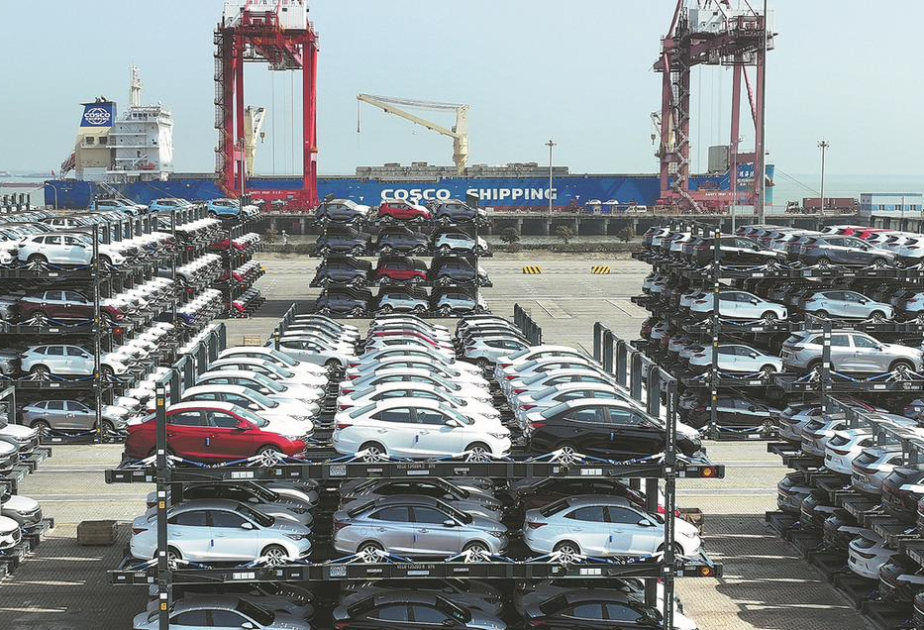The Biden administration on Friday locked in steep tariff hikes on Chinese imports, including a 100% duty on electric vehicles, to boost protections for strategic industries from China's state-driven industrial practices, Reuters reported.
The U.S. Trade Representative's office said that many of the tariffs, including a 100% duty on Chinese EVs, 50% on solar cells and 25% on steel, aluminum, EV batteries and key minerals, would take effect on Sept. 27.
The USTR determination published on Friday and first reported by Reuters, showed that a 50% duty on Chinese semiconductors, now including two new categories - silicon wafers and polysilicon used in solar panels - is due to start in 2025.
The action, which marks the end of a more than two-year review of tariffs that had been imposed by former president Donald Trump, mostly left unchanged the top-line duty increases announced in May by President Joe Biden. These include a new 25% tariff on lithium-ion batteries, minerals and components, with those for EVs taking effect on Sept. 27, and those for all other devices on Jan. 1, 2026.
The Biden administration also left in place Trump's tariffs on over $300 billion worth of Chinese goods ranging from toys and t-shirts to internet routers and industrial machinery at rates of 7.5% to 25%.
The final decision largely disregarded pleas from automakers for lower tariffs on graphite and critical minerals used in EV battery production because they are still dependent on Chinese supplies.
The action drew industry complaints that the increases would disrupt supply chains, including for semiconductor-intensive products, and do little to stop China's technology transfer and industry domination practices that have led to excess factory production now flooding global markets.
"Since implementation, the tariffs have cumulatively cost American businesses and consumers $221 billion, while failing to alter Chinese trade policies and practices of concern," Information Technology Industries Council President Jason Oxman said in a statement. "With today's announcement, USTR once again relies on the blunt and ineffective tool of tariffs with no support for their effectiveness."
Lael Brainard, the top White House economic adviser, told Reuters the decision was made to ensure that the U.S. EV industry diversifies away from China's dominant supply chain.
She said such "tough, targeted" tariffs are needed to counter China's state-driven subsidies and technology transfer policies that have led to over-investment and excess production capacity. Washington is investing hundreds of billions of dollars worth of its own tax subsidies to develop domestic EV, solar and semiconductor sectors.
"The 100% tariff on electric vehicles here does reflect the very significant unfair cost advantage that Chinese electric vehicles in particular are using to dominate car markets at a breathtaking pace in other parts of the world," Brainard said. "That's not going to take place here under the vice president's and the president's leadership."
A spokesperson for China's embassy in Washington said the U.S. tariffs would "backfire", adding that they would also fail to suppress China and solve U.S. industrial problems.
"The 301 tariff is the product of unilateralism and protectionism, and it reflects the hegemonic nature of U.S. power politics," the spokesperson said in a statement.
"China firmly opposes this and will take all necessary measures to safeguard its own rights and interests."
The higher U.S. tariffs take effect as Trump and Vice President Kamala Harris are both courting voters in auto and steel producing states, trying to position themselves as tough on China ahead of the November presidential election. Trump has vowed to impose 60% tariffs on all Chinese imports.
The European Union and Canada also are imposing new tariffs on Chinese EVs, the latter matching the 100% U.S. duties.
The final tariff decision does provide some temporary relief for U.S. port operators who were facing a new 25% tariff on massive ship-to-shore cranes, an industry that China dominates with no U.S. producers.


















